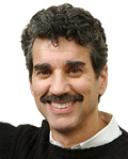Genetics
The Good, The Bad, and The Society
What role has narrow self interests played in recent events and what can we do?
Posted February 4, 2009
This past year, Chicagoans have heard the uplifting rhetoric of now-President Obama at Grant Park in November and the surrealistic explanations of now-impeached Governor Blagojevich for his alleged attempts to sell gubernatorial appointments. These contrasting episodes of idealism and corruption represent the broad scope of human nature, which, according to new findings in brain and behavioral science, includes not only the impulse to pursue narrowly defined self-interest, but also an impulse to serve social concerns greater than the self.
In recent years, society has all but relegated the pursuit of the collective interest to the world "as it ought to be," a pursuit given lip service at religious services, political rallies, and during half time at sporting events as coaches try to motivate their teams. Meanwhile, we have grown to accept self-interest as the only force that really matters in "the world as it is," the hard-nosed world of making a living and paying the bills, and of running a political machine. The thought that, outside their own immediate families, people are motivated by anything other than ambition and greed is considered naïve. To see the world as fundamentally Machiavellian is considered rational and realistic.
The problem with these assumptions is not only that they are simplistic and misleading, but that by accepting them as factual, we perpetuate a tyranny of low expectations, and we fail to employ other levers for human advancement that are at our disposal.
The behavioral and brain sciences, combined with the interpretive findings from primatology and anthropology, demonstrate that homo sapiens is an obligatorially gregarious species, meaning that we have always lived in social structures in which our survival and the survival of our offspring (and, thus, our genes) are heavily dependent on others. According to the "social brain hypothesis," the driving force behind the evolution of enhanced intelligence was the need to manage the intricate social bonds that kept us alive. The line of hominids that led to us branched off on its own distinctive path as much as seven million years ago. During 99.9 percent of that vast expanse of time, the interest of the individual and the interest of the family or tribe were so tightly intertwined as to be almost indistinguishable.
Even if a brutal egoist could survive for a while at the expense of those around him, without a healthy and sustainable framework of social bonds to protect them, rarely if ever would his heirs live long enough to reproduce. Thus the genes that survived as part of our biological heritage are heavily biased toward the formation and attentive maintenance of human attachments. That is evidenced by how social context "gets under our skin" in profound ways: Loneliness, for instance, can alter the DNA transcription in your immune cells. The emotional restraint in your partner that causes his or her blood pressure to increase may increase your own blood pressure as well.
All animals must self regulate their internal physiology to stay alive. As obligatorially gregarious hominids, we also co-regulate each other, not just physiologically, but through myriad means such as the establishment and enforcement of social norms. The crimes of which Governor Blagojevich is accused, like the recent excesses that led to the collapse of Wall Street, represent not just a failure of ethical watchdogs or federal regulators, but also the failure of society's individual agents-you and me-to enforce higher standards.
Families and tribes have always wielded the power of guilt, shame, ostracism, reproach, and other expressions of social disapproval. As a result, they have always been blessed or burdened with the behaviors they accept as the norm.
All civilizations have informal and formal systems to promote social over selfish-interests, including taboos, moral codes, and laws. As in the Broken Windows theory of policing, small infractions matter because they set a negative tone that cascades into more negative behavior in more and more people. If it seems okay to throw trash here, more people will throw trash. If we think everyone cheats on his or her taxes, we are more likely to cheat. If, on the other hand, we think everyone is paying his or her fair share, we are more likely to pay what we owe. Controlled studies show that when we experience helpfulness, we immediately become more helpful. The same kinds of studies show that when we are primed to think about money, we become less helpful, and we try to distance ourselves from others.
The world of politicians, like the world of Wall Street bankers and Fortune 500 CEOs, exists as a separate tribe that establishes and maintains its own norms. Yet each of these tribes is part of the larger tribe of society at large, which also has the ability to enforce norms through social approval or social disapprobation. When President Obama speaks of changing Washington, he is speaking about changing the norms under which our elected politicians operate. When he speaks of changing Washington, he is speaking to us as much as he is speaking to his political colleagues because achieving this change requires the collective support of us all.
Greed can never be justified, either from the school of "rational self interest" that drives some aspects of Neoclassical economics, or from the "they're all a bunch of crooks" school that simply abdicates responsibility and looks the other way. Top down efforts to constrain self-interested behavior-legal sanctions and moral codes-can only do so much. Any such efforts to improve human behavior need to be complemented by bottom up efforts: it lies in what we as individuals envy, accept, expect, sanction, and celebrate.
-John Cacioppo and Bill Patrick


